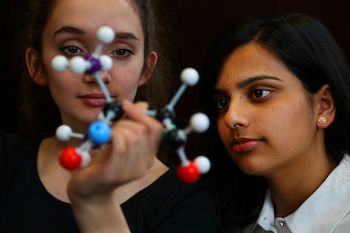 Ahead of International Women in Engineering Day (INWED) on Sunday 23 June, new research by the Institution of Engineering and Technology (IET), finds that nearly two-thirds (64%) of British women are considering taking on careers in engineering despite there only being 12 per cent* currently in industry.
Ahead of International Women in Engineering Day (INWED) on Sunday 23 June, new research by the Institution of Engineering and Technology (IET), finds that nearly two-thirds (64%) of British women are considering taking on careers in engineering despite there only being 12 per cent* currently in industry.
When exploring the reasons why, the IET led research found that nearly a fifth of women (17%) suggest the disparity in those thinking about pursuing engineering and those who follow through could be down to a lack of visible role models. This becomes most evident when considering the 28 per cent of women who don’t think they’re clever enough to consider pursuing a career in engineering.
Worryingly, outdated visions of the industry could also be contributing, with 18% feeling it’s not suited to their gender, whilst a further 13% are put off by the fear of being discriminated against.
This can be seen most prominently with nearly half (49%) of the population feeling STEM industries are outwardly sexist.
Jo Foster, IET diversity and inclusion manager, said: “The statistics present quite a shocking picture of the public’s views of gender disparity in engineering. The belief that it’s not important to address the gender imbalance is very naïve and could be very detrimental to businesses and organisations that won’t reap the benefits that come from a diverse workforce.
“It’s vital we turn this around and work hard to understand and solve the reasons why women in particular feel that engineering careers aren’t for them. This could be ensuring we have more positive women role models, changing the perception of engineering and technology careers and working more closely with businesses.
“Good news is, we are moving in the right direction. Although small progress has been made, the fact that nearly two-thirds of women are interested in engineering careers is something to be celebrated and we will work hard to support as many as we can in the early stages of their careers.”
STEM careers however are valued significantly, with almost a fifth (19%) of the public understanding both the wide range of job opportunities available and the earning potential of an engineering career.
To mark this year’s INWED, and to highlight diversity across engineering and technology – not just gender – the IET has launched its new social media campaign #IAmAnEngineer, which features a variety of real-life engineers. To view the video, visit the IET’s social media channels.
NMiTE – New Model in Technology and Engineering – is an initiative backed by government, educators, and industry, to transform engineering education in Britain. Located in Hereford, NMiTE aims to secure university status and become Britain’s first wholly new, purpose-built UK university in 40 years.
The NMiTE project is crucial to Britain’s competitive future. Engineers are key to mastering major world challenges – from sustainable food production to cybersecurity to Artificial Intelligence and more – but the UK is critically short of them.
Sarah Hitt, Full Professor in Engineering Education, NMiTE, has eight years’ experience in engineering education and joined NMiTE as Full Professor in June 2019, where she focuses on the social context of engineering.
NMiTE – New Model in Technology and Engineering – is an initiative backed by government, educators, and industry, to transform engineering education in Britain. Located in Hereford, NMiTE aims to secure university status and become Britain’s first wholly new, purpose-built UK university in 40 years.
The NMiTE project is crucial to Britain’s competitive future. Engineers are key to mastering major world challenges – from sustainable food production to cybersecurity to Artificial Intelligence and more – but the UK is critically short of them.
How do you think engineering will #transformthefuture?
Lindsey Day, Partnership Associate, NMiTE: The focus for engineering is changing. As an industry, it is becoming more high profile in solving the ‘big issues’ that the world is currently facing, such as environmental concerns, and is therefore being better recognised for its integral role in transforming the future.
I see engineering as the way we can make changes and bring new ideas to life – whether that is making new products or finding new or improved ways of doing things.
What makes engineering a great career choice for women?
Sarah Hitt, Full Professor in Engineering Education, NMiTE: It’s often said that women like to work in caring roles, and I can’t think of anything more caring than being an engineer. The work that engineers do is so impactful on our everyday existence and there’s a feeling of great responsibility – by its very ethos being an engineer will be attractive to many women. At my previous university the students were 27 per cent female, however the programme that I led was 60 per cent female as it dealt more with the human and social side of the work. The students were good at maths and science but wanted to work with people – it’s important to highlight that this is a key part of engineering. Sarah Hitt, Full Professor in Engineering Education, NMiTE: My own understanding of what an engineer does has rapidly changed. Engineering is interactive, it’s teamwork, it’s all about design. It is so much more dynamic and creative than I originally thought.

